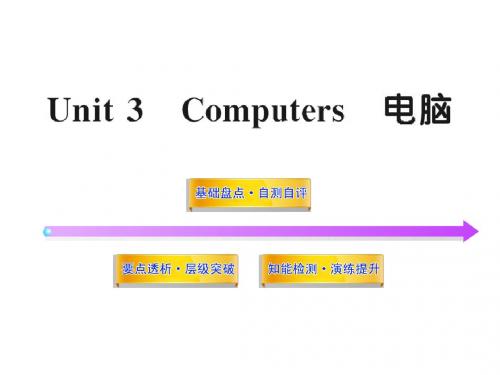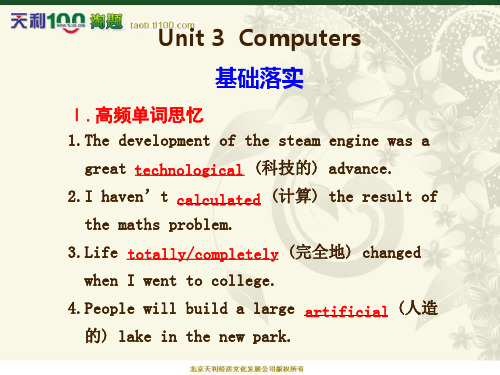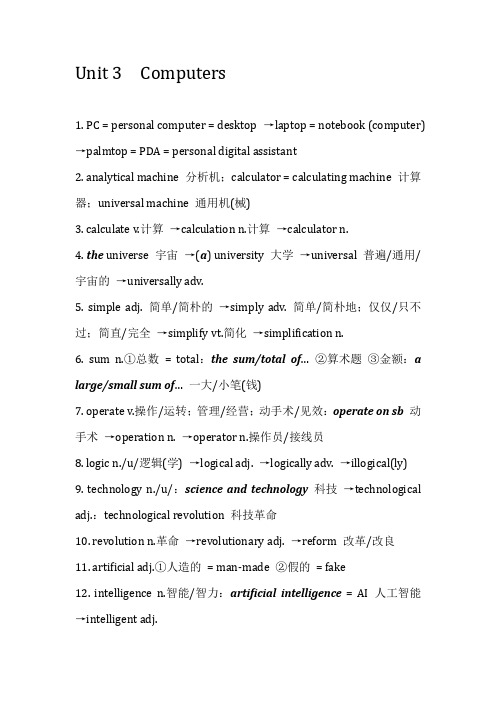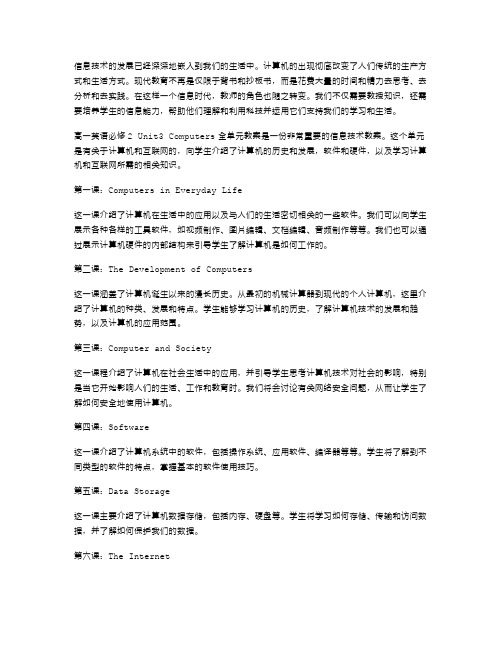高中英语必修2 Unit 3 Computers
- 格式:doc
- 大小:61.00 KB
- 文档页数:2




人教版高中英语必修二(Book 2 Unit 3)Unit 3 Computers核心单词1. common adj. 共同的,普遍的;常见的常用结构:in common 共有,公用(在句中多作状语)have nothing/little/a lot/something in common (with) sb. 与某人没有/许多/有些共同之处in common with 和……一样common sense/knowledge 常识common welfare 公共福利易混辨析common/ordinary/usual/normalcommon 指"共有的,公共的;共同的;常见的"。
反义词为rare。
common作"普通的"讲时可与ordinary换用。
如"普通人"也可以说成common people。
ordinary 意为"普通的,平淡无奇的",指没有什么特别的地方。
usual 意为"平常的,通常的,一向的",含惯例之意。
normal 意为"正常的"。
Jane and I have nothing in common.=I have nothing in common with Jane. 我与简毫无共同之处。
The problems are common to all societies. 这些问题是所有社会的通病。
In common with many young people, he prefers pop songs.和许多年轻人一样,他喜欢流行歌曲。
He is in ordinary clothes. 他穿着平常的衣服。
We meet every day at the usual place. 我们每天在往常那个地方见面。
单项填空Harry visited the bookstore every week. He became sucha______________customer that the bookseller gave him some books as presents.A. commonB. normalC. usualD. average解析:选C。

Unit 3Computers1. PC = personal computer = desktop →laptop = notebook (computer) →palmtop = PDA = personal digital assistant2. analytical machine 分析机;calculator = calculating machine 计算器;universal machine 通用机(械)3. calculate v.计算→calculation n.计算→calculator n.4. the universe 宇宙→(a) university 大学→universal 普遍/通用/宇宙的→universally adv.5. simple adj. 简单/简朴的→simply adv. 简单/简朴地;仅仅/只不过;简直/完全→simplify vt.简化→simplification n.6. sum n.①总数= total:the sum/total of…②算术题③金额:a large/small sum of…一大/小笔(钱)7. operate v.操作/运转;管理/经营;动手术/见效:operate on sb动手术→operation n. →operator n.操作员/接线员8. logic n./u/逻辑(学) →logical adj. →logically adv. →illogical(ly)9. technology n./u/:science and technology科技→technological adj.:technological revolution科技革命10. revolution n.革命→revolutionary adj. →reform 改革/改良11. artificial adj.①人造的= man-made ②假的= fake12. intelligence n.智能/智力:artificial intelligence = AI 人工智能→intelligent adj.13. solve vt.解决= work out →solution n.:a solution to…problem14. mathematics n.数学= math(s) →mathematical adj.15. from…on 从…时起→from now/then on16. real/really/realize →reality n.现实/事实:in reality = in fact17. personal adj.①私人的:personal affairs 私事②个人的:personal computer/opinion ③亲自的:personal visit →personally adv.①就个人而言=personally speaking ②亲自= in person = for oneself18. as a result (单用)结果≠as a result of… =because of…因为/由于19. total ①adj.总的/整个的②n.总数/合计:in all= in total总计→totally adv. = completely = entirely = fully = wholly 完全/彻底地20. apply to sb for sth向…申请…;apply…to…把…涂抹/敷贴在…;把…运用于…;使….适用于…;apply to…适合/适用于…;apply oneself to…专心/致力于…→application n.:application form申请表→applicant n.申请者21. finance n./u/金融/财经→financial adj.:financial crisis 金融危机22. mobile phone= cellphone 手机;explore v.探索/探测→exploration/explorer n.;anyhow = anyway无论如何/不管怎样23. goal n.①目标= aim:achieve one’s goal ②球门:goal keeper ③进球/得分;support vt.支撑/支持/赡养→supporting adj.24. happy/happily/happiness;human race = man = mankind 人类25. download 下载→upload 上传;program(me)→programmer26. classmate/schoolmate/deskmate/teammate/roommate n.27. sign n.标记/痕迹;迹象/征兆→signal ①n.信号/暗号②v.发信号/暗号;示意:signal (to) sb for sth;signal (to) sb to do sth28. type ①n.类型/型号≈kind:a type of…②v.打字:type…in 打入→typist 打字员;typewriter 打字机29. in a/one way在某种程度上;在某个方面→in the/one’s way挡道→in…way用…方法→by the way顺便说/问一下→on the/one’s way (to sp)在(去…的)路上30. coach n.教练;长途客车;with the help of = with one’s help31. arise (arose, arisen) vi.①升起②产生/出现:arise from… = arise out of… = result from…由…引起→result in = lead to = cause导致32. electricity n./u/电→electric/electrical/electronic adj.33. appear/disappear vi.→appearance n.①出现②外貌= looks:Never judge a man by his appearance. 人不可貌相34. character n.①人物/角色②字符/文字:Chinese character汉字③性格/特性④特点/特征(= feature/characteristic)35. mop ①n./c/拖把②/-ping, -ped/拖;擦:mop…up36. deal with①处理/对待/应对:+ sth/sb②交易:deal with sb→how to deal with…→what to do with…→have something/nothing to do with…和…有关/无关37. watch over sb/sth看守/监视→watch/look out (for…)小心…38. niece 侄女/甥女→nephew 侄子/外甥。

信息技术的发展已经深深地嵌入到我们的生活中。
计算机的出现彻底改变了人们传统的生产方式和生活方式。
现代教育不再是仅限于背书和抄板书,而是花费大量的时间和精力去思考、去分析和去实践。
在这样一个信息时代,教师的角色也随之转变。
我们不仅需要教授知识,还需要培养学生的信息能力,帮助他们理解和利用科技并运用它们支持我们的学习和生活。
高一英语必修2 Unit3 Computers全单元教案是一份非常重要的信息技术教案。
这个单元是有关于计算机和互联网的,向学生介绍了计算机的历史和发展,软件和硬件,以及学习计算机和互联网所需的相关知识。
第一课:Computers in Everyday Life这一课介绍了计算机在生活中的应用以及与人们的生活密切相关的一些软件。
我们可以向学生展示各种各样的工具软件,如视频制作、图片编辑、文档编辑、音频制作等等。
我们也可以通过展示计算机硬件的内部结构来引导学生了解计算机是如何工作的。
第二课:The Development of Computers这一课涵盖了计算机诞生以来的漫长历史。
从最初的机械计算器到现代的个人计算机,这里介绍了计算机的种类、发展和特点。
学生能够学习计算机的历史,了解计算机技术的发展和趋势,以及计算机的应用范围。
第三课:Computer and Society这一课程介绍了计算机在社会生活中的应用,并引导学生思考计算机技术对社会的影响,特别是当它开始影响人们的生活、工作和教育时。
我们将会讨论有关网络安全问题,从而让学生了解如何安全地使用计算机。
第四课:Software这一课介绍了计算机系统中的软件,包括操作系统、应用软件、编译器等等。
学生将了解到不同类型的软件的特点,掌握基本的软件使用技巧。
第五课:Data Storage这一课主要介绍了计算机数据存储,包括内存、硬盘等。
学生将学习如何存储、传输和访问数据,并了解如何保护我们的数据。
第六课:The Internet这一课介绍了互联网的原理和应用。
Unit 3 Computers 单元要点预览Ⅰ词语辨析Ⅱ词性变化Ⅲ重点词汇1. sum n. 金额; 款项; 总数; 总和[典例]1). He was fined the sum of 200. 他被处以200英镑罚金。
2). The sum of 5 and 3 is 8. 5加3的和是8。
[重点用法]in sum简言之; 总而言之sum sb/sth up形成对某人[某事物]的看法[练习] 中译英1). 总之, 计划告吹了。
______________________________________________________________________ 2). 我认为她是个很能干的经理。
______________________________________________________________________2. advantage n.优点;优势;有利条件[典例]1). He has the advantage of a steady job. 他有工作稳定的有利条件。
2). They took full advantage of the hotel's facilities. 他们充分利用旅馆的设备。
[重点用法]take advantage of 对……加以利用;欺骗to sb.’s advantage 对某人有利have /get/win an advantage over 〔of〕胜过;优于[练习] 中译英1).协议对我们有利。
______________________________________________________________________ 2).她利用了我的慷慨。
______________________________________________________________________3. goal n. 球门;进球得的分;目标[典例]1). He headed the ball into an open goal. 他乘虚把球顶入球门2). We won by three goals to one 以三比一获胜。
Unit 3 Computers本堂课包括Warming up 和Reading 两部分。
他们是语言知识和文化意识的输入过程;是语言技能、情感态度和学习策略的培养过程,也是语言输出过程。
在整个教学过程中,它是培养学生阅读能力的主要过程,教学重点是阅读技能的培养、交际能力及情感态度的提升。
Warming up部分根据每个人对电脑的看法不同让学生就“Do you like computer?”进行小组探究和讨论,从自身实际出发谈论自己的看法,有助于激发学生对于整个单元的学习兴趣。
Reading部分(Computers)主要讲述的是电脑的发展史,通过一系列问题的设置让学生能够在全面理解文章的基础上提高信息处理、加工和学习的能力。
Knowledge objectives:掌握以下词语和句型:Calculate,sum, solve, simplify, artificial, intelligence, revolution,reality, totally, application, finance, in common, over time, as a result, from···on, so···that. Ability objectives:训练学生一定的阅读技巧,使他们掌握一些有效的学习策略,从而提高阅读速度和篇章理解的准确性,并养成一定的自主学习能力;培养学生快速阅读的能力、捕捉信息的能力及运用语言进行交际的能力。
Emotion objectives:通过对“computer”的学习,启发学生思考电脑给我们带来的影响,从而以一种正确的方式利用电脑和网络资源;另外通过电脑的发展历程让学生意识到科技对生活的影响。
1. 教学重点:1.了解计算机的发展过程,进一步认识计算机的演变以及对人类的影响。
2.训练学生的阅读技巧,提高学生阅读速度和理解能力。
高中英语必修2 Unit 3 Computers1.discuss doing sth讨论/商量做某事have a discussion about sth讨论某事under discussion 在讨论中under construction在建造中We discussed holding the sports meet next week .They discussed Mary’s joining the League .They had a discussion about selling the house .The plan is under discussion .mon adj.常见的共同的in common 共同have something / nothing / much / little in common (with …)common sense 常识common language普通话common mistake常见错误ordinary adj.平凡的an ordinary person / soldier / teacher / workerusual adj. 惯常的 as usual跟往常一样general adj. 一般的in general = generally speaking一般说来总之The condition is most common among teenagers aged 18 to 24 .The book which I have read recently is about ordinary people.This book is intended for(为...而编写)the general reader, not for the specialist.As usual, he arrived early and started to work.The two brothers own the company in common .They have something in common with you .3.anyhow = anyway = in any case不管怎样无论如何________________(无论如何),I must finish the work today .4.sound 连系动词+adj.(做表语) “听起来”:What you said ________ reasonable . sound like + n.“听起来像”: That _______________ a helicopter . sound as if(though)+句子: Her voice sounds as if she has a cold .5.universal adj.宇宙的普遍的通用的全世界的in the universe 在宇宙中Our world is but a small part of the universe.English is a universal language . It is a universal truth (普遍真理). Climate change is a universal problem(全球性的问题).6.go by = pass经过:The boy sat and watched the cars go by.时光流逝:Time went by(=passed) slowly.顺便走访:She was in when I went by yesterday.判断:You can't go by what he says; he's very untrustworthy(靠不住的).Going by the traffic rule, the driver should be punished.7. in the 1990s在二十世纪九十年代in the nineties在九十年代in one’s nineties在某人九十多岁的时候It was not rare in the 1990s that people ____________________(五十多岁的)went to university for further education .8. have no choice but to do sth 除了…别无选择do nothing but do sth除了…什么也做不了I have no choice but __________(do) as (按照)you tell me .He did nothing but __________(stay) at home .9. lonely adj.孤独的寂寞的荒凉的(deserted) –带感情色彩alone adj. & adv.单独的(地)I am ________ , but I never feel ________ .He ___________________________(一直过着孤寂的生活)in the country .13.(all)by oneself单独地learn sth by oneself 自学=teach oneself sthleave sb by oneself 把某人单独留下She used to sit by herself(=alone) and read .She can’t leave her son by ________,because he will be afraid and cry .I learn English by myself . =The boy did the work all by himself .Nobody helped him .14.watch over看守监视Do not be afraid; God will watch over us.The robber __________________ by three policemen .A nurse sat _________________ him .15.no longer / not…any longer 不再(时间修饰延续性动词be teach live work)no more / not…any more 不再(数量或程度修饰非延续性动词come go make)I am ______________ a student .= I am _____ a student ______ ______.He ____________ lives here .= He ______ ______ here ______ ______. We won’t make the same mistake ____________ .You can drink _______________.= You ______ drink ______ ______.The boy doesn’t want ______________ .The rope is no longer than that one .(和…一样不长)16.develop Vt.& Vi.发展开发培养研制冲洗A child develops rapidly between the ages of 13 and 16.He developed a special interest in artificial intelligence .Can you develop this film for me ?He developed a new type of intelligent robot .17.from then on从那时起(一般过去时)since then 从那时起(现在完成时) They didn’t see each other from then on/after that .He went to Tokyo in 1956 and has lived there since then .I have lived here since four years ago (since I came to Beijing in 2007).18.type n.类型样式典型 v.打字 typist 打字员 typical adj.典型的 a type ofThe type of skirt is all the go(非常流行). 一种He is a fine type of the youth.Do you think butterfly is a type of (一种)insect?19.arise Vi.出现发生起身 (arose arisen) arise from/out of起因于产生于The country's present difficulties arise from the reduced value of its money. Accidents often arise from carelessness. = result fromNo mistakes could arise. 不会出差错 A new difficulty has arisen.How did this quarrel arise? =happen20.on在…的旁边是…的成员在…工作London is on the Thames . He is on the People’s Daily .Tom is on our football team . Which side are you on in the game ?21.advantage n. 优点(势)有利条件 disadvantage n. 缺点劣势have an advantage over胜过优于take advantage of乘机利用捉弄欺骗to sb’s advantage = to the advantage of sb 对某人有利We should take full advantage of (=make full use of)the lab’s equipments. You have an advantage over me in experience .It is unmoral(不道德的)to take advantage of the deformities(残疾人) .22.connect…with / to …把…和…连接起来(有形物)接通电话be connected with = be related to 与…有关(无形抽象)Will you connect this wire to the television ?The Panama Canal connects the Atlantic with the Pacific .Connect me with Beijing University .That old man was suspected(被怀疑)to be connected with the crime.23.serve vt.为…服务 He served the people heart and soul .招待顾客 What may I serve you with ?端上供应 Food will be served between 12:00 and 14:00 .serve as充当担任:He volunteered to serve as the manager of our factory.24.My goal is to provide humans with a life of high quality .She has a new car of her own (属于她自己的).But in reality (=in fact)he has a long way to go .As time went by , I did research into how to make my radio .In a way(在某种程度上)our programmer is like our coach .He won first place(获得第一名)in this maths competition .句型语法1. There are/were times when…有时常会…There was a time when…曾经一度 There are times when I feel my present job is too much for me.There were times when she felt quite chilly(寒冷).There was a time when the star was popular with the young .2. By the time (到…为止接句子)I was sixteen , my dream ________(come)true.By (到…为止接短语)the 1940s I ___________(grow)as large as a room.By the end of last year, we __________(learn)more than 2,000 English words.I won’t believe you until I have seen/see you with my own eyes .强调句:_____________________________________________________________ 倒装句:_____________________________________________________________They didn’t see the Great Wall until they came to China .强调句:_____________________________________________________________ 倒装句:_____________________________________________________________ He wasn’t freed until last year.强调句:_____________________________________________________________ 倒装句:_____________________________________________________________4. 现在完成时的被动语态:have/has been done。